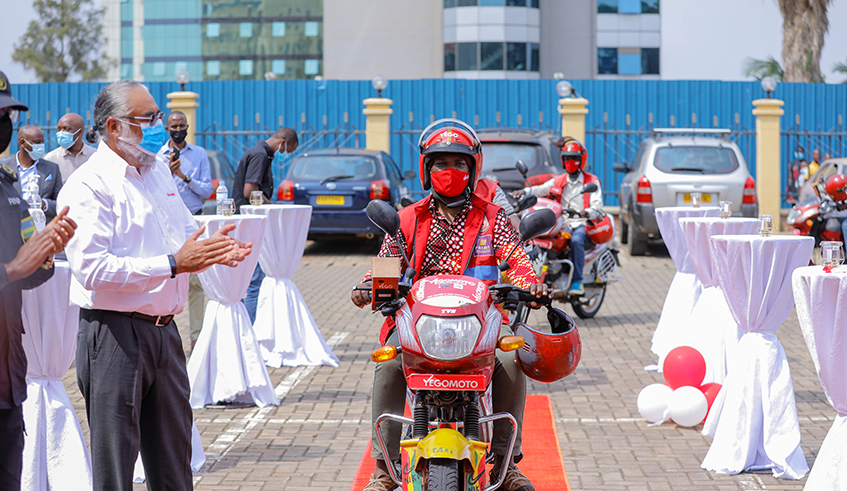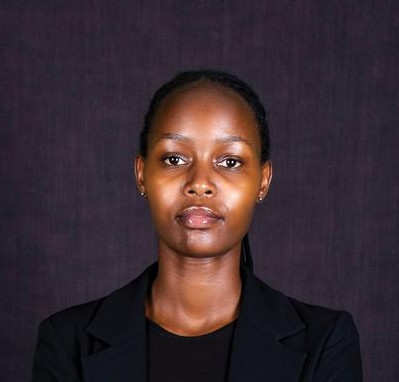

Yego Innovision Ltd on Friday officially launched the Intelligent Connected Fare Metres (ICFM) known as ‘smart metres' for the first time in the world and over 19, 000 taxis motos will be connected in Kigali.
The smart metres which automatically generate the fare after a passenger has been dropped off, had its first phase launched on Friday, January 7 at the City of Kigali (CoK).
With a metre, the first two kilometres of the ride will cost Rwf300 while the rest of the journey will cost Rwf107 per kilometre.
However, beyond 40 kilometres, the tariff increases to Rwf187.


The ICFMs are not only expected to digitize the taxi moto service but will provide enhanced safety, security, accountability, and transparency among other benefits.
Yego’s ICFMs accept digital payments from MTN’s MoMo, SPENN and Safari Bus Cards.
Speaking on the launch, Karanvir Singh, the CEO of Yego Innovision Ltd said that this was another win for the country.
"We are proud to have been given this opportunity by the Government of Rwanda to create this first-in-the-world project in Rwanda, for Rwanda”, Singh said
He added that it has been a long journey, saying that Yego's extensive project has been in the works for over five years now.
"Since 2016, we have worked closely with Rwanda Utility Regulatory Authority (RURA), Rwanda National Police, CoK, and other stakeholders to identify and address the real challenges faced by the motorcycle taxi industry, and only managed with their continuous support” he added.
According to him, they conducted detailed field surveys for over 9 months in 2016, and this gave them a deeper insight into how the moto taxis operate and this is how they came up with the concept of installing ICFMs.
The smart metres are in line with the Government’s vision of promoting a cashless economy as well as smart transport, different speakers said.
Commenting on this development on the same occasion, Pudence Rubangisa, the Mayor of CoK said that so far, riders are happy with these metres as it has many benefits.
Adding that now the next stage is the implementation and this is expected to curb various issues that used to inhibit this sector and called for joint collaboration for better execution of this project.
Ernest Nsabimana, the Director-General of RURA allayed fears of loss on riders or any other challenge due to the use of metres and assures to intervene and support from all project partners.
"We worked on this projects for a long time and we took time to consider all elements such as insurance cost, Fuel costs among others so that we can finally come up with fair tariff for providers, riders, and passengers but, we are still ready to receive any complaints and improve,” He said
Adding that RURA will take action on whoever will not comply with this development both the supplier as well as the riders.
Riders speak out
Fred Kalisa, a motorcyclist said that the initiative is good and recommended people to embrace it because it is in line with fighting Covid-19 as well as facilitating cashless payment.
Jean de Dieu Habiyakare, a motorbike rider based at Nyarugenge district said that he had a metre since last year and used it a few times but he is ready to start to use it more often and ready to report any abnormalities and expects that all people involved in this have resolved each and every problem faced in all previous phases of the project.
He added that some riders refused to use the metres due to unclear reasons and he urged them to give it a try and see the real truth about it before judging how it works.
In an interview, Daniel Ntaganda, the chairperson of Rwanda Federation of Taxi-Moto Operators said that they are going to work closely with the riders and promised to support them through addressing all issues.
Adding that metres go beyond just facilitating rides by bridging the digital divide.
"This will help them to adopt and understand technology, build credit scores, which can help them access finance, among other benefits,” he said


